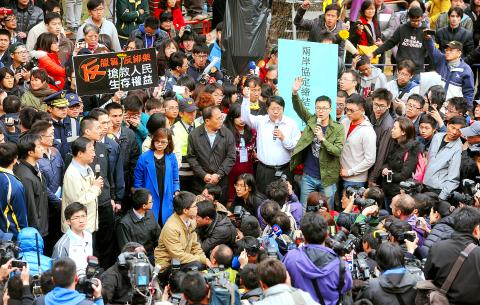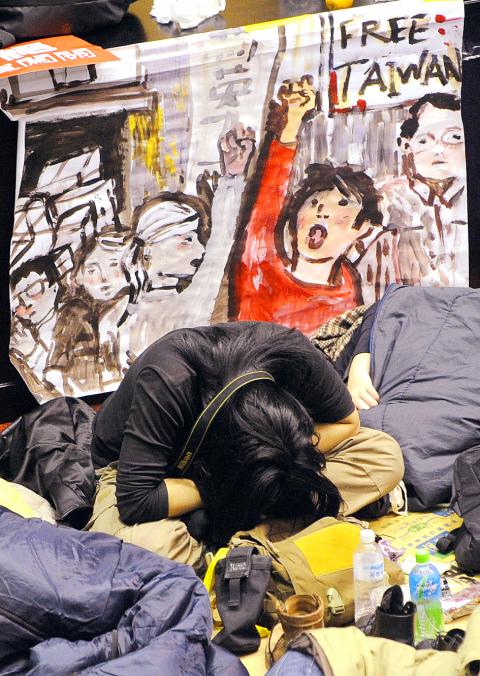Premier Jiang Yi-huah (江宜樺) met with the protesters occupying the legislature to protest the controversial cross-strait service trade pact yesterday — the fifth day of the student-led sit-in — but declined to agree to withdraw the deal or table a law monitoring future cross-strait agreements, saying that these two issues require the Executive Yuan’s and President Ma Ying-jeou’s (馬英九) involvement.
With the number of protesters surrounding the Legislative Yuan complex in Taipei in support of the student-led activists who seized the legislative chamer on Tuesday growing by the thousands each day, the premier yesterday met with protest leader Lin Fei-fan (林飛帆), a graduate student of political science at National Taiwan University, and attorney Lai Chung-chiang (賴中強).
Prior to Jiang’s arrival, Lin told the crowd that the preconditions for dialogue with the premier would be his agreeing to withdraw the service pact — which the Executive Yuan has forwarded to lawmakers for review — from the Legislative Yuan and to draft legislation on monitoring future cross-strait talks and agreements.

Photo: Liu Hsin-de, Taipei Times
“Withdraw the service trade agreement, pass the monitoring legislation,” demonstrators chanted as Jiang walked through the crowd escorted by police officers to reach the side gate of the Legislative Yuan building, where Lin and Lai were waiting.
Jiang began by dismissing rumors that the Executive Yuan has asked National Taiwan University Hospital — which is close to the legislature building — to make preparations to take in a large number of wounded as it is planning to clear the legislative floor by force.
“I’m saddened to hear these rumors, because they are baseless,” Jiang said. “The Executive Yuan has no plan to remove anyone by force and will fully respect the legislature’s prerogative to handle the situation in its own way.”

Photo: Chen Chih-chu, Taipei Times
However, the crowd was dismayed when Jiang said that the Cabinet supports the legislature’s article-by-article review of the agreement, but will not take withdraw the pact because it is “beneficial for the liberalization of the economy.”
He said there is no need to enact new laws to monitor cross-strait agreements since “the governing party [the Chinese Nationalist Party (KMT)] has already proposed measures pertaining to the monitoring of such agreements by the legislature and the public that are supported by Legislative Yuan Speaker Wang Jin-pyng (王金平). Therefore, there is no need for new legislation.”
The crowd of demonstrators voiced its displeasure at the premier’s remarks by reiterating the demands, but Jiang responded that this was not a decision he could take unilaterally.
“The last thing I want to say is that the two issues you [the protesters] are concerned about not only involve the Executive Yuan, but also President Ma Ying-jeou,” Jiang said.
“We’ve all heard what the premier said, so let’s unite to call on the president to take care of the issue,” Lin replied, as the crowd started chanting for Ma to “come forward and face the matter.”
After Jiang declined to agree to the two preconditions for dialogue with Lin and Lai, the crowd thanked the premier for his time and clapped to ask him to leave.
Later yesterday, Jiang called a press conference at the Executive Yuan and read out a statement addressed to the students.
He said he was happy to see young people voicing their views on issues concerning the nation’s future, but felt sad about and could not agree with their occupying the legislative chamber and behaving in a disorderly manner.
Jiang added that his visit to the site of the protest had been approved by Ma in advance and said he regretted that the students had not given him a chance to discuss with them what he said were their “misunderstandings” of the service trade pact based on “misleading information and rumors” just because he had not agreed to the preconditions.
“There should be no premise or preconditions for talks so we can have some space for rational communication,” Jiang said.
The premier again dismissed concerns over the potential negative impacts the trade pact would have on the nation and the lack of consultations with concerned parties before it was signed.
The movement against the trade pact was attributed to opponents’ “anti-China mindsets” that made them “oppose everything related to China,” Jiang added.
“It’s not because there was anything wrong with the agreement itself or the negotiations [with China], but because of the ‘anti-China mindset,’” Jiang said, adding that this stance would render “Taiwan incapable of reaching out to the world,” as well as “cause huge damage to the country’s future.”
He called on the students to disoccupy the legislative chamber as quickly as possible since it is a “sacred and solemn” place, the law-making supremacy of which has been established by the efforts of the countless people who fought for Taiwan’s democratization.

SECURITY: As China is ‘reshaping’ Hong Kong’s population, Taiwan must raise the eligibility threshold for applications from Hong Kongers, Chiu Chui-cheng said When Hong Kong and Macau citizens apply for residency in Taiwan, it would be under a new category that includes a “national security observation period,” Mainland Affairs Council (MAC) Minister Chiu Chui-cheng (邱垂正) said yesterday. President William Lai (賴清德) on March 13 announced 17 strategies to counter China’s aggression toward Taiwan, including incorporating national security considerations into the review process for residency applications from Hong Kong and Macau citizens. The situation in Hong Kong is constantly changing, Chiu said to media yesterday on the sidelines of the Taipei Technology Run hosted by the Taipei Neihu Technology Park Development Association. With

CARROT AND STICK: While unrelenting in its military threats, China attracted nearly 40,000 Taiwanese to over 400 business events last year Nearly 40,000 Taiwanese last year joined industry events in China, such as conferences and trade fairs, supported by the Chinese government, a study showed yesterday, as Beijing ramps up a charm offensive toward Taipei alongside military pressure. China has long taken a carrot-and-stick approach to Taiwan, threatening it with the prospect of military action while reaching out to those it believes are amenable to Beijing’s point of view. Taiwanese security officials are wary of what they see as Beijing’s influence campaigns to sway public opinion after Taipei and Beijing gradually resumed travel links halted by the COVID-19 pandemic, but the scale of

A US Marine Corps regiment equipped with Naval Strike Missiles (NSM) is set to participate in the upcoming Balikatan 25 exercise in the Luzon Strait, marking the system’s first-ever deployment in the Philippines. US and Philippine officials have separately confirmed that the Navy Marine Expeditionary Ship Interdiction System (NMESIS) — the mobile launch platform for the Naval Strike Missile — would take part in the joint exercise. The missiles are being deployed to “a strategic first island chain chokepoint” in the waters between Taiwan proper and the Philippines, US-based Naval News reported. “The Luzon Strait and Bashi Channel represent a critical access

Pope Francis is be laid to rest on Saturday after lying in state for three days in St Peter’s Basilica, where the faithful are expected to flock to pay their respects to history’s first Latin American pontiff. The cardinals met yesterday in the Vatican’s synod hall to chart the next steps before a conclave begins to choose Francis’ successor, as condolences poured in from around the world. According to current norms, the conclave must begin between May 5 and 10. The cardinals set the funeral for Saturday at 10am in St Peter’s Square, to be celebrated by the dean of the College